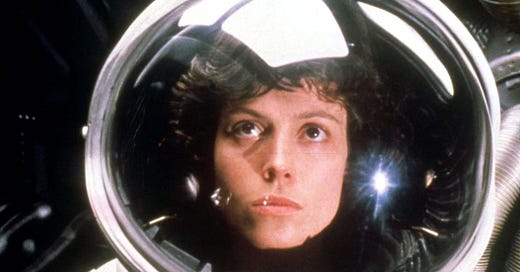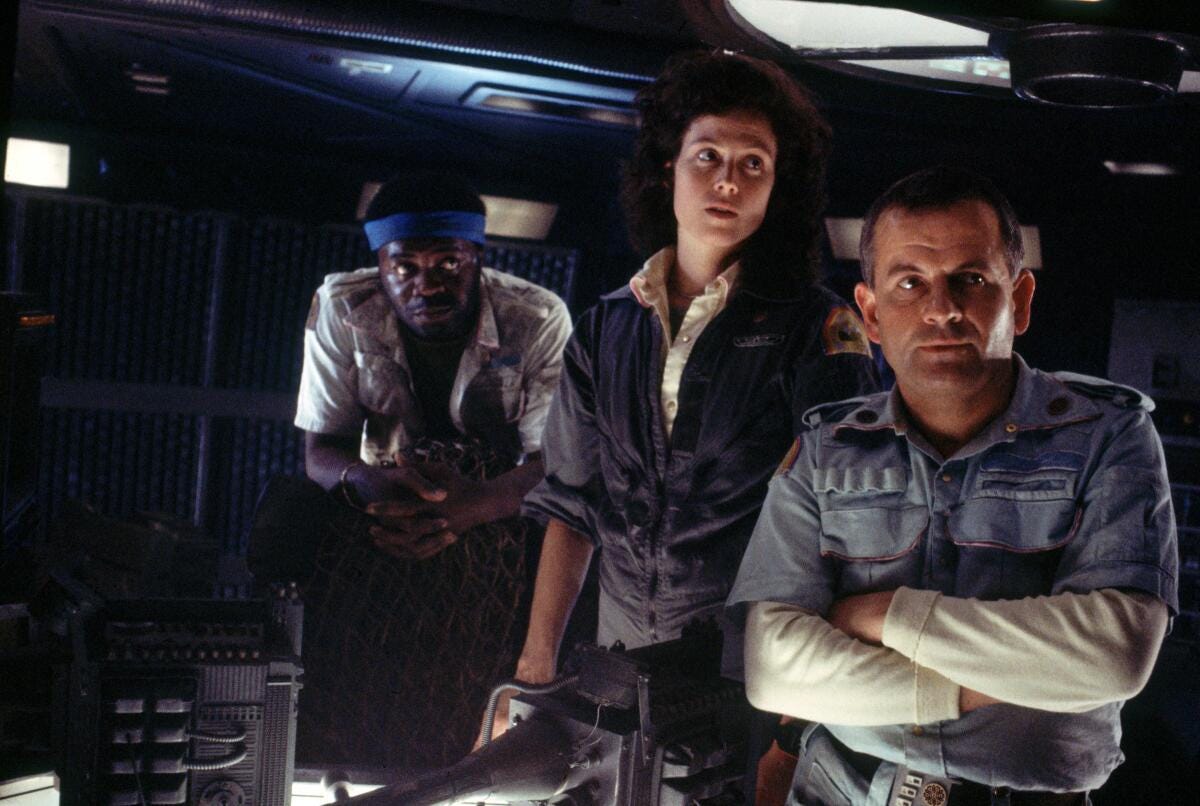Ridley Scott’s timeless 1979 film Alien is remembered first and foremost as a preeminent creature feature. Capitalizing on the wild success of Star Wars: Episode IV - A New Hope two years prior, and with major nods to 2001: A Space Odyssey, as well as Texas Chainsaw Massacre (according to Scott), the film is a science fiction thriller with old school horror movie bones. It shares the economical storytelling of all the best horror films with a simple, to-the-point set-up that is specific enough to engross the viewer but broad enough to contain allusions to more universal themes.
It was shot over just fourteen weeks, with an enormous team of people building the sets, miniatures, and creatures that are now indelible. Famed artist HR Giger was brought on board to design the aliens and spaceships and the Oscar-winning special effects that are still chilling forty-four years later. Who can forget that chest burster scene! And Sigourney Weaver’s badass performance as Warrant Officer Ellen Ripley has inspired generations of Halloween costumes.
There is a lot to recommend the film looking back, but at the time it was anything but a sure thing. The strong ensemble cast lacked a major movie star to guarantee success at the box office and director Ridley Scott had only one previous feature film under his belt. Reviews were mixed upon release, with the New York Times giving it an unimpressive review, but it was a hit with audiences at the box office, and its high reputation now proves the wisdom of the crowd then. Few original films have spawned its own universe of films more successfully than Alien, but the strength of this original film shows that solid storytelling begets more solid storytelling.
Set in the year 2122 on the cargo spaceship the Nostromo, the crew is waylaid on their journey back to Earth to investigate a strange distress signal from a nearby planet, unwittingly letting a malevolent alien life form back onto their ship, forcing them to fight for their lives. It’s a tried and true formula for effective scares and high stakes. But when I watch the movie now, I only think about one thing: the titular alien isn’t nearly as scary as the casual misogyny that allowed it onto the Nostromo.
I’ll explain. At every point, Weaver’s Ripley attempts to warn the crew about the recklessness of their actions, from their first contact with the alien until she is the last woman standing. When the ship has a rocky landing and needs repairs, Engineer Parker (Yaphet Kotto) quips, “She better stay the hell out of my way.” From the very first scenes, it’s clear no one respects her and no one wants to listen to her. When the alien attaches to Executive Officer Kane (John Hurt)’s head during their fact-finding mission, making him host to its future offspring, Captain Dallas (Tom Skerritt) takes him back to the ship and demands that Ripley let them back on board. But at this point, Ripley is the highest-ranking officer on the ship and she knows that letting Kane on board will compromise their safety, so she refuses. Seen as callous and defiant by the rest of the crew, her unpopular decision is overridden when Science Officer Ash (Ian Holm) goes against her orders and lets Kane and the others back on. It’s a classic example of how women’s authority is ignored, and their voices silenced in the workplace. For the Nostromo crew, the consequences of this instance of sexism are immediate.
If you’ve seen the movie you know that the subsequent massacre at the hands of the alien could have been avoided entirely if they had just listened to Ripley and followed procedure. And the male hubris doesn’t stop there! When Dallas orders the ship to take off for home, despite not having contained their extra-terrestrial invader and not being fully operational, Ripley warns him not to and he doesn’t listen. When she begins to suspect that Ash is hiding something, and shares her mistrust with Dallas, he ignores her. As the creature picks off crew members one by one, all her fears and warnings come true: Kane, Dallas, and Engineer Brett all perish and Ash is revealed to be an android sent by their employer to preserve the alien at the expense of the rest of the crew. Finally, only Ripley, the Cassandra of this story, manages to escape before the ship self-destructs, and she faces off with the alien alone, emerging victorious.
It’s safe to say that most women have never had to defend themselves or their colleagues from a murderous alien life form, but most women have experienced some form of sexism and felt erased, ignored, and belittled because of it. Many women feel they’ve been conditioned from birth to identify problems before they occur and feel responsible for preventing them to spare those around them from discomfort or pain. At the same time, we are too often told these concerns are unreasonable, that we should not speak up, and that our job is to be compliant and easygoing. That we should stay the hell out of everyone else’s way. The frustration that comes from being ignored, from being gaslit into thinking you’re overreacting and then proved right only after it’s too late, is the source of the true tension in the film. And the terror that is unleashed aboard the Nostromo is secondary to the terrible ignorance that brought it into their midst.
I’m not arguing that Scott, or screenwriter Dan O’Bannon intentionally made Alien to be a feminist parable. But the horror genre, for all its historical shortcomings and marginalization of women and minorities, is also famous for the “final girl” trope. This film, like the many that have utilized the final girl before and after, communicates the resilience of women and what can happen when their thoughts and feelings are ignored by the men around them. To me, this is what has continued to make Alien such a standout achievement, and what has made Weaver’s performance so iconic. It’s an extremely effective and compelling space-opera horror juggernaut, but to me, there is more to get angry about than there is to be scared of.







This is a tremendous examination of the male gaze or at least a classic devaluing of feminine level-headedness and leadership qualities. I doubt that Scott was being particularly progressive in his approach to women's roles [and place] in society and their voice (more perhaps reflecting the du jour attitudes) but noting his other films ("Gladiator" comes to mind), I can't see it. Still, this piece is magic. Thanks for putting it out there.
I really identified with your words about what it's like to be a woman in the workforce here! Instant restack. Blade Runner, another Ridley Scott film, really kicks the misogyny into high gear. If he's critiquing misogyny, it sure doesn't come off that way to me. Instead, his takes often come out half baked and unclear. Happy to see more folks writing and talking about this phenomenon!